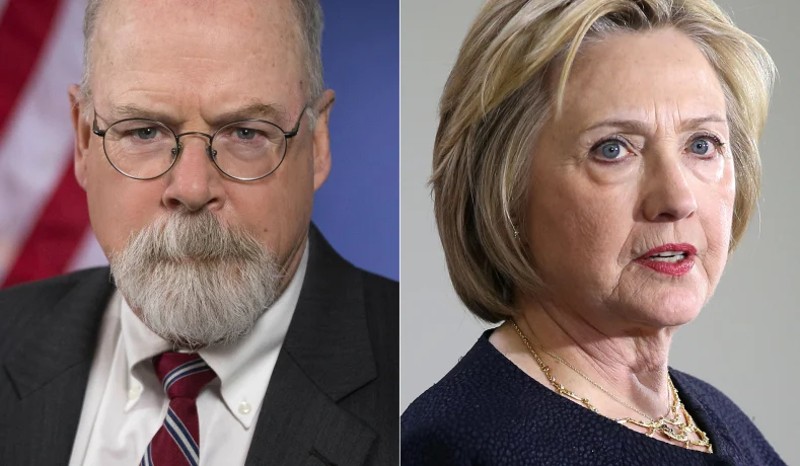OPINION: This article may contain commentary which reflects the author's opinion.
Special Counsel John Durham has revealed in court filings that staffers at the political research firm at the center of the so-called “Russiagate” scandal sent hundreds of emails to journalists containing unsubstantiated allegations against and claims about then-GOP presidential nominee Donald Trump.
The purpose of leaking the claims was to generate negative news coverage about the Republican candidate, the filing stated.
Durham’s filing came in response to efforts by lawyers with ties to Hillary Clinton’s failed 2016 presidential campaign to keep potentially explosive evidence out of his hands ahead of an upcoming trial involving Michael Sussmann, a Clinton campaign attorney who has been accused of lying to the FBI.
In a late Monday court filing, Durham said the wave of emails undermines claims by the Clinton campaign that Fusion GPS’s research on behalf of her presidential effort ought to remain confidential as part of attorney-client privilege.
According to the Washington Times, the stories peddled to media included:
• A Wall Street Journal article about a Trump adviser meeting with a former KGB official close to Russian President Vladimir Putin.
• A Washington Post story about a Trump campaign adviser investing in Russia.
• New York Times and Reuters articles about the FBI investigating a secret communications setup between Mr. Trump and Russia’s Alfa Bank.
GOP Sen. Ron Johnson of Wisconsin said the special counsel is exposing the Clinton campaign’s “political dirty tricks.”
“We’ve known for quite some time what happened here. And what the Durham indictments are just proving is how not only complicit but the Clinton campaign did this. They literally did this,” he told the Times.
“What the Clinton campaign did in terms of political dirty tricks, we are still putting up with the repercussions. Would Vladimir Putin have invaded Ukraine if Trump was still in office? That’s an interesting question,” he added.
The attempt to bar the evidence from being admitted is likely to fail, Just the News reported, citing several experts who are observing the case.
“[T]he sweeping requests for confidentiality — including research from former MI6 agent and opposition researcher Christopher Steele — face a high hurdle,” experts said, Just the News reported earlier this week.
“That’s because the very subjects the Clinton campaign now seeks to protect — such as its now-discredited anti-Trump research — were widely distributed without regard to privilege for years,” the report continued.
The contents of the now-infamous Steele dossier, for instance, were shared with several news reporters, the FBI, and the State Department. Steele himself talked extensively about his 2016 conversations and dealings with the Clinton law firm, its research firm Fusion GPS and the FBI in a British court case
Sussmann shared much of a research project — which turned out to be untrue — alleging a secret communications channel at the Alfa Bank between Trump and the Kremlin.
And several of the Clinton campaign figures gave testimony to Congress that exposed who paid for the research falsely tying Trump to Russia, what was in it, and why it was conducted.
Said another way, each of the disclosures to third parties amounted to a waiver of any attorney-client privilege claims, at a minimum.
“It is clear as a matter of law and legal ethics that legal research intended to be made public is not protected by attorney-client privilege,” Alan Dershowitz, a Harvard Law professor who supported Clinton in 2016 but dismisses her privilege claims now, told Just the News. “Even if it were, any privilege would be waived by testimony given about the research or the product.”
Meanwhile, Kash Patel, a former federal prosecutor who took the lead in exposing the Russia collusion hoax while serving as chief investigative counsel for the House Intelligence Committee, added that Durham has several options for beating back the belated privilege claims, “including the argument it does not apply in a circumstance where lawyers were passing along false information,” Just the News reported.
House Judiciary Committee member Rep. Andy Biggs (R-Ariz.), meanwhile, remarked that the Clinton campaign’s claims of privilege were ridiculous.
“I think their attorneys missed that 15 minutes in ethics class, which tells you that you’ve waived the privilege when you start leaking it or even have somebody present while you’re discussing it,” Biggs told “Just the News, Not Noise” TV show. “That’s not part of the attorney-client relationship.
